Florida
Newly introduced Florida bill could destroy LGBTQ nonprofits
It would establish “biological” pronouns as official state policy
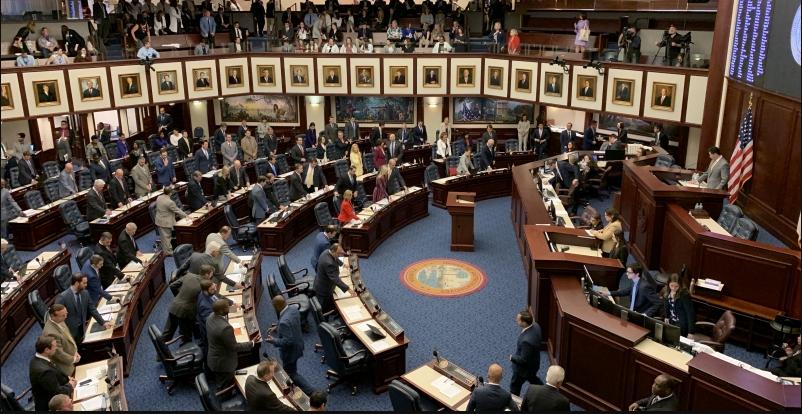
By Erin Reed | A new bill just introduced in Florida aims to expand “Don’t Say Gay Or Trans” provisions to a broad range of workplaces. Targeting government employees, contractors, and nonprofits, the bill sets forth restrictions and bans on policies relating to pronouns, gender identity, and sexuality.
Specifically, it would prohibit state and local government employees as well as any contractors engaged with the government from changing their pronouns or honorifics if they do not match their assigned sex at birth. It would also bar them from instructing on gender identity or sexuality, similar to “Don’t Say Gay Or Trans” laws already active in the state education system. The legislation would establish “biological” pronouns as official state policy.
The bill also would establish protections for what it calls “deeply held biology-based beliefs.” It may even prevent all nonprofits in the state from mandating any “training, instruction, or other activity on sexual orientation, gender identity, or gender expression,” a clause that could destroy LGBTQ+ nonprofits across Florida.
The bill, HB599, was introduced by Representative Ryan Chamberlin, a Republican. The bill is split into two sections, with the first section applying to government employees and contractors, which it defines as “an individual, partnership, corporation, or business entity” that “enters or attempts to enter into a contract for services” with any state, county, municipality, or special district of Florida.
These definitions encompass a huge number of businesses, such as stadiums, convention centers, major hospitals, insurance agencies, and more. For these businesses, as well as for all government workers, the bill would declare that it is the state’s policy that “a person’s sex is an immutable biological trait and that it is false to ascribe to a person a pronoun that does not correspond to such person’s sex.” It then would bar covered employees from sharing pronouns that “do not correspond to that person’s sex,” effectively banning social transition at work for these employees.
See the provisions barring pronouns, honorifics, and more here:
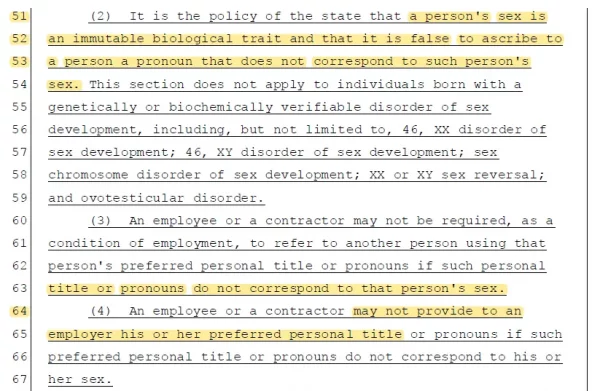
The bill also would enshrine a new phrase into law: protections for employees “deeply held religious or biology-based beliefs.” The phrase “deeply held religious beliefs” has longstanding precedent in constitutional law and is used to overturn laws judged to be violating someone’s freedom of religion.
Deeply held “biology-based” beliefs, however, are not something that has ever been a part of any law. It would appear that this line is meant to provide religious-based protections to people who assert that their misgendering of transgender people and using transgender people’s old names is part of their “biology-based” rights.
The bill is not limited in its application to government employees and contractors, however. A separate section of the bill would apply to “nonprofit organizations or an employer who receives funding from the state.” In the most broad reading of this section, separating “nonprofit organizations” from “employers who receive funding from the state,” it would bar all such organizations from mandating “training, instruction, or other activity on sexual orientation, gender identity, or gender expression.”
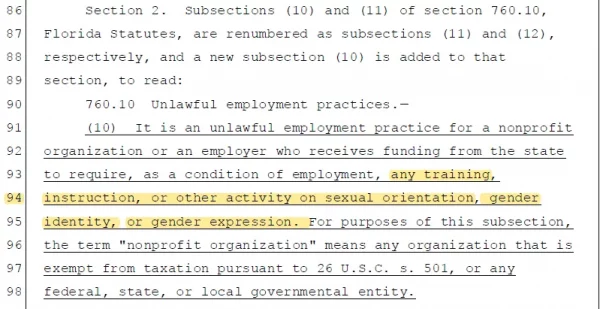
Provisions in HB 599
This provision is severe in its potential impact. Virtually every LGBTQ+ organization would be radically affected by it and would likely have to shut down. It would be nearly impossible for an LGBTQ+ organization to run without providing instruction, training, and “other activity” around gender identity or sexuality. It would be a blatant power grab by the state targeting organizations critical to the government and would further drive LGBTQ+ activism and organizing underground in the state. If enforced broadly, this section could have a similar impact to laws in Russia designed to shut down LGBTQ+ organizations there.
This section would have impacts far beyond LGBTQ+ organizations as well. The provisions would apply to “any organization that is exempt from taxation” including “s. 501” organizations. This would include, for instance, 501c4s, which are crucial during election cycles and could be used to target left-leaning organizations running election ads. Many of these organizations have LGBTQ+ employees and provide instruction and accommodations for their employees, which would be barred by the state if this gets passed into law.
It could also have impacts on medical organizations that do business with state and local governments. Planned Parenthood, a 501c3, heavily provides care for LGBTQ+ people, and such a law could be used to target the organization statewide. Likewise, many state hospital systems that do business with the government often must educate employees and patients on HIV and AIDs, which is impossible to divorce from LGBTQ+ issues. Community health clinics would, similarly, have to contend with these provisions.
'Don't say gay' for nonprofits: @RyanDChamberlin files bill that would restrict LGBTQ nonprofits receiving state funding
— Florida Politics (@Fla_Pol) November 21, 2023
Reporting by @JacobOgleshttps://t.co/oaAfC0gTuz#FlaPol
Brandon J. Wolf, the National Press Secretary for the Human Rights Campaign said to the Blade in a statement Tuesday: “This Florida bill is a hateful, anti-LGBTQ+ monstrosity. It is dangerous, unconstitutional, and we know it’s just the start of politicians’ attacks on our community this legislative session. We’re prepared to fight back.”
This legislation represents an early move in what promises to be a challenging year for anti-LGBTQ+ legislation in 2024. Historically, Florida has often been the breeding ground for new laws aimed at the LGBTQ+ community. This bill might well serve as a precursor to the next “model policy” that could be replicated in multiple states, and bears close watching.
****************************************************************************

Erin Reed is a transgender woman (she/her pronouns) and researcher who tracks anti-LGBTQ+ legislation around the world and helps people become better advocates for their queer family, friends, colleagues, and community. Reed also is a social media consultant and public speaker.
Follow her on Twitter (Link)
Website here: https://www.erininthemorning.com/
******************************************************************************************
The preceding article was first published at Erin In The Morning and is republished with permission.
Florida
Professor at Baptist university in Virginia found dead in Florida gay sauna
Orlando police say cause of death undetermined

A beloved professor of psychology at Averett University, a private Baptist university in Danville, Va., was found dead on March 16 of unknown causes at the Club Orlando, a popular sauna and bathhouse for gay men located in Orlando, Fla.
University officials said David Hanbury, 37, an Associate Professor of Psychology who taught at the university since 2015, was in Orlando attending a conference of the Southern Psychological Association and had initially been reported missing by family members before he was found deceased.
Orlando police told USA Today the cause of death had not been determined but the death “does not appear suspicious at this time.” USA Today reports that police said their investigation into the death was “active and ongoing.”
A spokesperson for the Orange County, Fla., Medical Examiner told the Washington Blade it would take about 90 days for the completion of blood work and toxicology tests to confirm the cause of death in a case like this, where there were no obvious signs of injury or illness.
Cassie W. Jones, Associate Vice President of University Marketing and Communications at Averett University, declined to disclose whether Hanbury self-identified as gay in response to an inquiry from the Blade
“As an employer, we cannot comment on our employees’ personal matters,” Jones said. But when asked if the university would have continued to treat Hanbury with respect and support his tenure at the university if he had come out as gay, she said “absolutely” in an email response to Blade questions.
“Dr. David Hanbury was a dear professor, colleague and friend whose influence was far reaching,” Jones said in a March 21 message to the Blade, “We send our affection, condolences, and prayers of support to Dr. Hanbury’s family, friends and all others upon whom he had a lasting impact.”
The Averett University website shows that it has a policy of nondiscrimination that includes the categories of sexual orientation and gender identity among other categories such as race, religion, and ethnicity. The website also shows that the university has an LGBTQ student group called the Gender and Sexuality Alliance or GSA group.
Jones said the admiration and longstanding support of Hanbury from his fellow professors and students was reflected in a March 18 memorial gathering for him on campus.
“Nearly 250 students, faculty, staff, and community members joined as one Averett family, united in grief and sorrow, as we gave thanks for the remarkable life and influence of Dr. Hanbury on our lives and on the University,” Jones said.
“Averett University is committed to inclusion and belonging for all who learn, work and visit our campus,” Jone told the Blade. “Openness and inclusivity are embedded in our institution’s core values, and we know our diversity makes us stronger.”
The Baptist Standard, an independent newspaper that reports on the Baptist Church, reported in a May 9, 2011, story that the Baptist General Association of Virginia severed ties with Averett University in 2005 over a disagreement with the university’s position on homosexuality. Other news reports at the time said the Baptist organization objected to the university’s support for a gay student group.
Jones, in her message to the Blade, said Averett University currently “is a part of the Baptist General Association of Virginia family of educational partners.” She added, “We are aligned in our commitment to meet students wherever they are in their faith journey, and welcome those of all faiths or no faith.”
Florida
Settlement and clarification reached in Fla. ‘Don’t Say Gay’ law
Republican Gov. Ron DeSantis signed statute in 2022
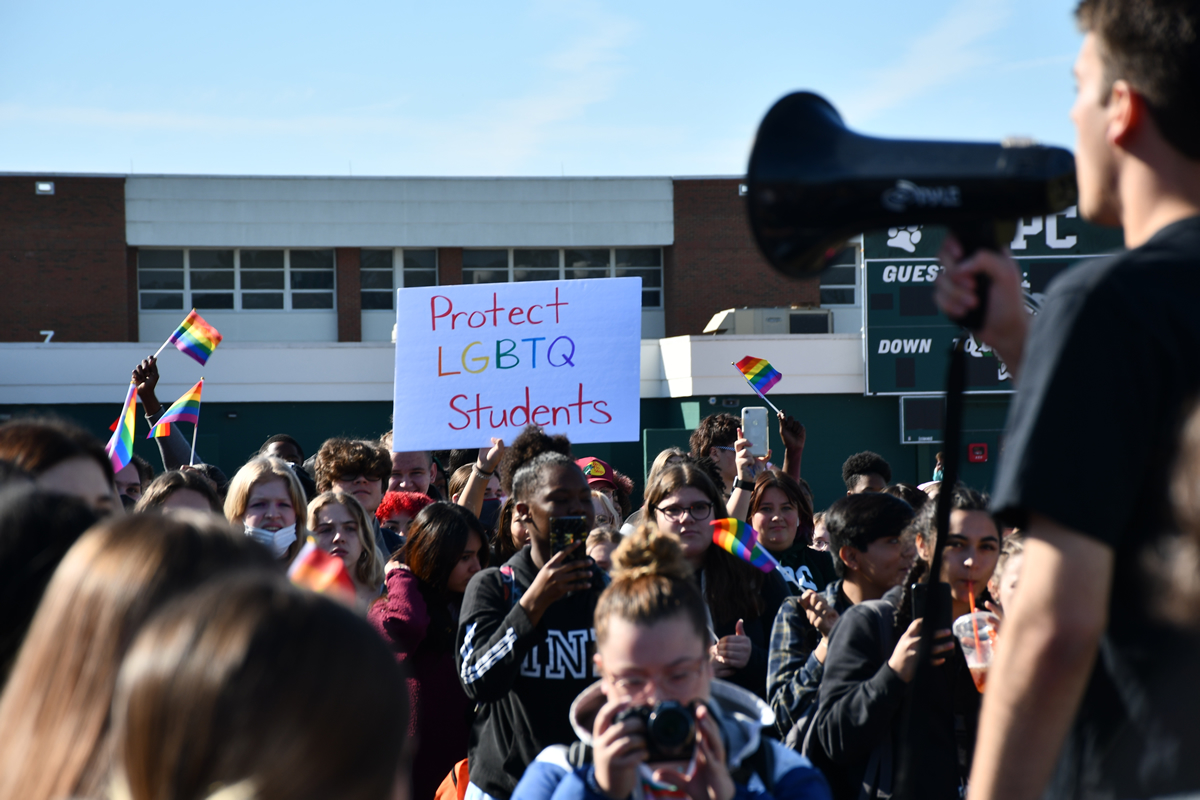
A settlement reached with the Florida State Board of Education, Florida Department of Education and various school districts and the attorneys and plaintiffs clarifies what is allowed in Florida classrooms under the state’s controversial “Parental Rights in Education” law colloquially referred to as the “Don’t Say Gay” law.
The plaintiffs’ lawyers at Kaplan Hecker & Fink LLP and the National Center for Lesbian Rights filed the agreement with the 11th U.S. Court of Appeals on Tuesday. The agreement effectively nullifies the most dangerous and discriminatory impacts of the law, and makes clear that the law must be applied neutrally and is no license to discriminate against or erase LGBTQ+ families.
Cameron Driggers and Jack Petocz, who led the statewide student protest against the ‘Don’t Say Gay’ law in March 2022, reacted in a text message to the Washington Blade saying:
“LGBTQ+ students and allies are breathing a sigh of relief today in response to the news that litigation has successfully mediated some of the most extreme aspects of Gov. DeSantis’ ‘Don’t Say Gay’ legislation. Just about two years ago, we led a statewide school walkout all across the state of Florida in response to that bill. We knew then that it infringed on the basic civil liberties of students and teachers and we look forward to future challenges to other pieces of authoritarian legislation.”
“The settlement restores the ability of students, teachers and others in Florida schools to speak and write freely about sexual orientation and gender identity in class participation and schoolwork,” the legal teams noted in a statement. “It also restores safeguards against bullying on the basis of sexual orientation and gender identity, and reinstates Gay-Straight Alliances (GSAs). Critically, the settlement also requires the State Board of Education to send today’s agreement to every school district, and to make clear that the settlement reflects the considered position of the state of Florida on the scope and meaning of this law.” the statement continued.
Specifically, the historic settlement agreement clarifies the following:
- Classroom references. The law does not prohibit references to LGBTQ+ persons, couples, families, or issues, including in literature, in classroom discussion (such as student-to-student speech or teachers responding to students’ questions), in students’ academic work product or teachers’ review of the same, in teachers identifying same-sex or transgender spouses or partners, or in any other context in which a teacher is not “instructing” on the subject of sexual orientation or gender identity.
- Nondiscrimination. The law does not target LGBTQ+ persons, couples, families or issues. Rather, it requires neutrality and prohibits “classroom instruction” on the subjects of sexual orientation or gender identity, whether the subject addresses heterosexuality, homosexuality, bisexuality, cisgender identities, transgender identities or otherwise. It would violate the law, then, to instruct that heterosexuality is superior to other sexualities, or that cisgender identities are superior to transgender identities.
- Anti-bullying and acceptance. The law does not prohibit instruction or intervention against bullying on the basis of sexual orientation or gender identity, nor does it require the removal of safe space stickers or elimination of safe space areas for the benefit of LGBTQ+ persons.
- Extracurricular activities. The law does not prohibit Gay-Straight Alliances, including student attendance or participation by teachers or other faculty members. The law also does not prohibit book fairs that include LGBTQ+ focused books, musicals or plays with LGBTQ+ references or characters, participation and expression by LGBTQ+ persons in other extracurricular events like school dances, or the wearing of clothing that is affiliated with LGBTQ+ persons or issues or that does not conform with one’s perceived gender identity.
- Library books. The law does not apply to library books, so long as those books are not being used in the classroom to instruct on the subjects of sexual orientation or gender identity.
- Third parties. The law does not apply to non-school-personnel, including parents, other family members, and guest lecturers, so long as the school is not delegating to such third party the role of providing classroom instruction on the subjects of sexual orientation or gender identity.
“We made a promise to LGBTQ+ families, students and educators across the state to ensure that they received equal dignity under the law, and to protect our schools from a censorship agenda that harms the education system as a whole,” said Equality Florida Executive Director Nadine Smith. “Florida has already endured nearly two years of book banning, educators leaving the profession and safe space stickers being ripped off of classroom windows in the wake of this law cynically targeting the LGBTQ+ community. This settlement is a giant step toward repairing the immense damage these laws and the dangerous political rhetoric has inflicted on our families, our schools and our state. The message to school districts, superintendents and teachers alike is clear: Protect every student and respect every family.”
In early 2022, Republican Gov. Ron DeSantis signed House Bill 1557, commonly known as the “Don’t Say Gay” bill. The plaintiffs sued the next day, alleging that the law was impermissibly vague, was obviously motivated by hostility to LGBTQ people and families and created an enforcement system that enabled discrimination and discouraged efforts to fight it. The plaintiffs claimed that the law violated their rights to equal protection, due process, and free speech. The plaintiffs litigated aggressively, and engaged in months of negotiations with the state’s lawyers to forge Monday’s historic settlement.
“This settlement is a huge victory for our community, both in Florida and nationally. It not only reverses the censorship and intimidation created by Florida’s ‘Don’t Say Gay or Trans’ law, it codifies important new protections that were not previously clearly established, such as the right of teachers and staff to talk about LGBTQ people, to put safe space stickers in their classrooms, and to be open about their own LGBTQ identities or same-sex partners, just as straight teachers are able to be,” said NCLR Legal Director Shannon Minter in a phone statement to the Blade. “I am thrilled to be part of this historic moment, which is a strong sign that the tide of anti-LGBTQ hatred and persecution is turning, thanks to the hard work of so many.”
Human Rights Campaign National Press Secretary Brandon Wolf issued the following statement:
“This is more evidence: The tide is turning on the anti-LGBTQ+ agenda. In state legislatures and courtrooms in Florida and beyond, discriminatory policies are starting to collapse. The DeSantis administration was forced to acknowledge that their vague, broad law was having sweeping consequences. And this settlement makes clear that every student deserves a safe, welcoming school environment where their families are treated with the respect that they deserve — and that what applies to LGBTQ+ people must apply to others equally. Thank you to the legal team and courageous plaintiffs for challenging this discriminatory law.”
Florida
Fla. DMV: ‘Misrepresenting’ gender on drivers licenses is fraud
HRC, Equality Florida condemn decision to rescind previous policy

BY ERIN REED — According to a letter submitted by an anonymous source on Monday, the Florida Department of Highway Safety and Motor Vehicles has rescinded the policy that allowed transgender individuals to update the gender marker on their driver’s licenses.
The letter, written by Deputy Executive Director Dave Kerner, states that gender will be interpreted as “biological sex.” Furthermore, the letter declares that any person “misrepresenting” their gender marker would be guilty of fraud, facing civil and criminal penalties and revocation of licensure.
The letter, apparently sent out on Jan. 26, asserts that “gender” is synonymous with “biological sex,” and argues that gender identity is “neither immutable nor objectively verifiable.” It suggests that permitting trans individuals to update their gender markers on their driver’s licenses would “prevent the state from enforcing its laws.” These laws include bans on trans individuals using the bathroom of their gender identity and laws targeting adult medical care.
You can view the full copy of the letter here:
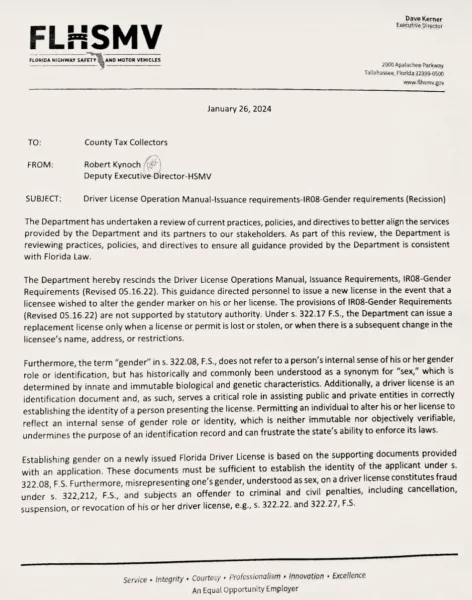
The move marks a significant escalation and seems to have been initiated unilaterally by the department. This action is in line with other unilateral measures taken by the executive branch in Florida and other states. These include the Florida Board of Medicine’s ban on trans care, Virginia Gov. Glenn Youngkin’s directive through the Board of Education to ban trans bathroom usage in schools, and Missouri Attorney General Andrew Bailey’s efforts to target adult trans care via the rule-making process. However, none of these examples previously involved driver’s licenses. If upheld, Florida would become the first state to prohibit driver’s license changes under criminal penalty for trans individuals.
The ramifications of this rule could be far-reaching. All trans individuals in the state with Florida driver’s licenses not aligning with their “biological sex” might immediately be in possession of a fraudulent license. The state could seek to suspend or revoke the licenses of trans individuals under this policy. Moreover, during traffic stops involving trans individuals, they could face legal challenges with police officers if the officers believe the driver’s license “misrepresents” their “biological sex.”
State Rep. Anna Eskamani appeared to confirm that computer systems were no longer accepting gender changes at FLHSMV offices:
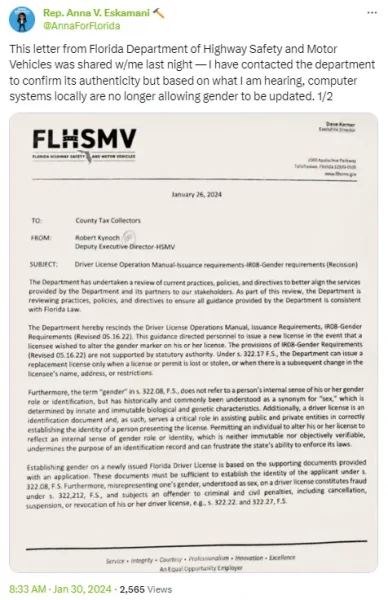
This development coincides with the consideration of two bills in Florida that aim to prohibit driver’s license changes through the legislative process: House Bills 1233 and 1639. These bills could require all Floridians to sign “biological sex affidavits” when renewing or updating their driver’s licenses. The policy could be a strategy to deter trans Floridians, aware of the bills, from quickly updating the gender marker on their driver’s licenses before their passage. Notably, Florida driver’s licenses typically have long expiration periods, often lasting eight years post-issuance.
Under this policy, trans individuals in Florida could face considerable challenges in daily life. Many have already left the state, and of those remaining, 80 percent reportedly wish to leave. This policy could instantly criminalize trans individuals who drive in the state with updated gender markers. It would compel trans people to disclose their identity in any situation requiring a driver’s license. Additionally, it would provide Florida a means to enforce its bathroom laws, which criminalize trans individuals for using bathrooms that align with their gender identity in many public spaces.
Nadine Smith, executive director of Equality Florida, issued the following statement:
“The DeSantis administration’s obsession with scapegoating transgender Floridians has escalated into an outrageous attack that further erodes freedom and liberty in our state. This cruel policy threatens transgender Floridians with civil and criminal penalties and blocks them from obtaining the critical government-issued identification necessary to continue their daily lives. Transgender people have always existed in every culture on every continent and always will. In Florida, tens of thousands of people have legally updated their gender marker on their driver’s license or ID. They carefully followed the rules to ensure their identification accurately reflects who they are, and they trusted this process. Now, an abrupt policy reversal has thrown their lives into chaos. The cruelty of this kind of government overreach and intrusion should alarm every Floridian. These reckless and hateful policies are intended to make the transgender community feel unsafe and unwelcome in Florida and to bully them out of public life entirely.
We know this is a devastating development, and we are working with our coalition partners, our grassroots volunteers, and our legal groups to figure out what options are available to fight back.”
The Human Rights Campaign reacted to this latest attack on the rights of trans Floridians in an emailed statement by HRC President Kelley Robinson:
“For years, transgender people have warned of radical anti-LGBTQ+ forces’ true aim: to abuse governmental power to take away our freedoms and drive trans people out of public society,” said Robinson. “From AG Paxton hunting for private medical information of transgender children, to Florida’s assault on identification documents, to Midwest lawmakers saying the quiet part out loud, these right wing extremists are no longer hiding the ball. They want to humiliate, harass, and use policy to eliminate transgender people from public life. But you cannot legislate away the community. Transgender people are powerful. They are our friends, neighbors, and family members. And we will stand arm-in-arm with them to fight back against this sinister agenda.”
Florida currently occupies the most dangerous level on the Transgender Legislative Risk Assessment Map, “Do Not Travel.” The state’s oppressive laws have drawn similar travel advisories from HRC and Equality Florida. Should this policy be enforced, the state’s trans population will find it even harder to move freely and could come into conflict with law enforcement and criminal penalties just for having documents that match their gender identity. The policy appears to be the latest attempt at putting trans “eradication,” championed at CPAC, into action within the borders of Florida.
****************************************************************************
Erin Reed is a transgender woman (she/her pronouns) and researcher who tracks anti-LGBTQ+ legislation around the world and helps people become better advocates for their queer family, friends, colleagues and community. Reed also is a social media consultant and public speaker.
Follow her on Twitter (Link)
Website here: https://www.erininthemorning.com/
******************************************************************************************
The preceding article was first published at Erin In The Morning and is republished with permission.
-

 District of Columbia4 days ago
District of Columbia4 days agoCatching up with the asexuals and aromantics of D.C.
-

 South America3 days ago
South America3 days agoArgentina government dismisses transgender public sector employees
-

 Maine5 days ago
Maine5 days agoMaine governor signs transgender, abortion sanctuary bill into law
-

 District of Columbia4 days ago
District of Columbia4 days agoBowser budget proposal calls for $5.25 million for 2025 World Pride












